语用学英语论文
大学非英语专业本科学生英语语用能力培养启示论文

大学非英语专业本科学生英语语用能力培养的启示摘要:近年来,语用能力的培养在大学英语教学中越来越受到重视,教师和学生逐步认识到在真实语境中能够正确使用英语的重要性。
本文根据前人的研究和自身的教学经验,探讨了一些培养学生语用能力的方法,并阐述了自己在语用教学方面的一点启示。
关键词:非英语专业本科学生英语语用能力语法教学中图分类号:g63 文献标识码:a 文章编号:1673-9795(2012)12(b)-0155-01随着我国人才市场对复合型人才需求的日益增加,对大学生在英语实际应用能力方面的要求也逐步提高,在大学英语教学中,教师也越来越重视对大学生英语语用能力的培养。
语言学习即为了语言运用,因此培养大学非英语专业本科学生的英语语用能力已成为大学英语教学的一个重要部分,有助于提高大学生的英语实际运用能力。
1 教学启示多项研究和实验表明培养学生语用能力有助于降低或避免学生的语用失误,而且外语教学的目的不仅是教授语言形式或语言意义,更要令学生学会如何正确的使用语言,尤其是在不同的语言情景中恰当的使用语言,因此,教师有必要在课堂教学中向学生提供有用的建议来帮助主动的有意识的培养自己英语语用能力。
由于条件的限制,中国学生直接使用英语的语言环境较少,他们在英语学习中往往把精力放到课本或教师授课上,那么教师就有必要把语用知识引入到课堂教学中,这样对培养学生的语用能力是非常有益的。
就像何自然先生所说,语用知识应该被列入到教学计划中,因为它在英语教学中的重要性不亚于语法和词汇。
那么在大学英语课堂教学中引入语用教学的过程中,教师应注意以下问题。
1.1 教学材料的选用教师应选用注重语言交际功能的教学材料,教学材料应注重向学生介绍英语惯用语、成语、英美文化背景等知识。
1.2 英语口语教学教材中的会话练习有助于训练学生的语用能力,因为在会话中人们往往要遵循特定的言语行为和文化模式,教师可利用会话练习帮助学生更好的用英语进行交流。
语用学在英语教学运用论文
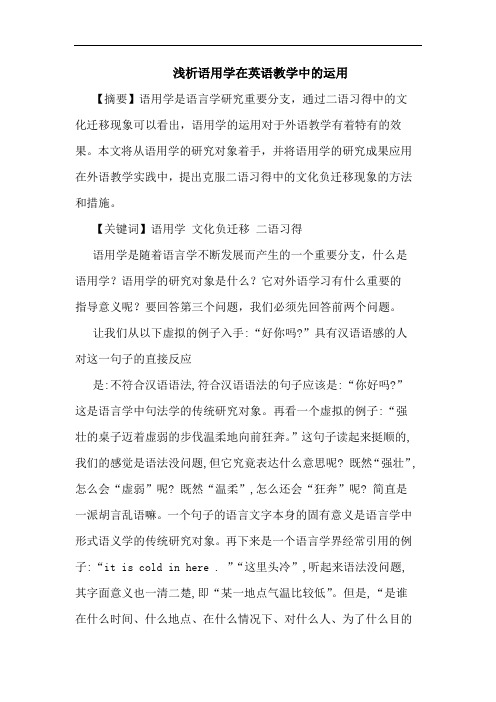
浅析语用学在英语教学中的运用【摘要】语用学是语言学研究重要分支,通过二语习得中的文化迁移现象可以看出,语用学的运用对于外语教学有着特有的效果。
本文将从语用学的研究对象着手,并将语用学的研究成果应用在外语教学实践中,提出克服二语习得中的文化负迁移现象的方法和措施。
【关键词】语用学文化负迁移二语习得语用学是随着语言学不断发展而产生的一个重要分支,什么是语用学?语用学的研究对象是什么?它对外语学习有什么重要的指导意义呢?要回答第三个问题,我们必须先回答前两个问题。
让我们从以下虚拟的例子入手:“好你吗?”具有汉语语感的人对这一句子的直接反应是:不符合汉语语法,符合汉语语法的句子应该是:“你好吗?”这是语言学中句法学的传统研究对象。
再看一个虚拟的例子:“强壮的桌子迈着虚弱的步伐温柔地向前狂奔。
”这句子读起来挺顺的,我们的感觉是语法没问题,但它究竟表达什么意思呢? 既然“强壮”,怎么会“虚弱”呢? 既然“温柔”,怎么还会“狂奔”呢? 简直是一派胡言乱语嘛。
一个句子的语言文字本身的固有意义是语言学中形式语义学的传统研究对象。
再下来是一个语言学界经常引用的例子:“it is cold in here . ”“这里头冷”,听起来语法没问题,其字面意义也一清二楚,即“某一地点气温比较低”。
但是,“是谁在什么时间、什么地点、在什么情况下、对什么人、为了什么目的使用了这句句子”。
(何兆熊,1989 :13) 就不是传统的句法学和语义学所能解决的问题,因为“说话人很可能是为了请听话人做点什么,比如关上门窗,打开暖气,借件衣服御寒等。
”(同上,1989 :14) 换句话说,这里要研究的不是句子本身的意义, 而是研究“语言在使用中的意义” ,“语言在语境中的意义”,归根结底是“说话人的意义”,也可简称为“话语意义”。
(何自然,1997 :122) 这就是语用学(pragmatics) 的研究对象。
以上只是对语言学中三个重要分支句法学、语义学、语用学的研究对象进行了粗略划分。
关于英语语言学论文免费参考例文
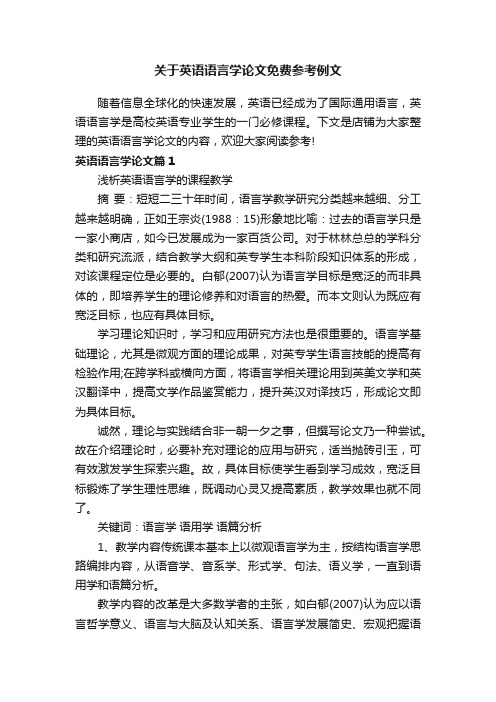
关于英语语言学论文免费参考例文随着信息全球化的快速发展,英语已经成为了国际通用语言,英语语言学是高校英语专业学生的一门必修课程。
下文是店铺为大家整理的英语语言学论文的内容,欢迎大家阅读参考!英语语言学论文篇1浅析英语语言学的课程教学摘要:短短二三十年时间,语言学教学研究分类越来越细、分工越来越明确,正如王宗炎(1988:15)形象地比喻:过去的语言学只是一家小商店,如今已发展成为一家百货公司。
对于林林总总的学科分类和研究流派,结合教学大纲和英专学生本科阶段知识体系的形成,对该课程定位是必要的。
白郁(2007)认为语言学目标是宽泛的而非具体的,即培养学生的理论修养和对语言的热爱。
而本文则认为既应有宽泛目标,也应有具体目标。
学习理论知识时,学习和应用研究方法也是很重要的。
语言学基础理论,尤其是微观方面的理论成果,对英专学生语言技能的提高有检验作用;在跨学科或横向方面,将语言学相关理论用到英美文学和英汉翻译中,提高文学作品鉴赏能力,提升英汉对译技巧,形成论文即为具体目标。
诚然,理论与实践结合非一朝一夕之事,但撰写论文乃一种尝试。
故在介绍理论时,必要补充对理论的应用与研究,适当抛砖引玉,可有效激发学生探索兴趣。
故,具体目标使学生看到学习成效,宽泛目标锻炼了学生理性思维,既调动心灵又提高素质,教学效果也就不同了。
关键词:语言学语用学语篇分析1、教学内容传统课本基本上以微观语言学为主,按结构语言学思路编排内容,从语音学、音系学、形式学、句法、语义学,一直到语用学和语篇分析。
教学内容的改革是大多数学者的主张,如白郁(2007)认为应以语言哲学意义、语言与大脑及认知关系、语言学发展简史、宏观把握语言学真正意义等四方面为重。
还有学者认为增加课外阅读材料以改进教学内容,如王扬(2004)和吴格奇(2005)主张选用有助于学生理解基本理论、概念的材料、辅之以拓宽视野的补充材料。
还有以宏观还是微观语言学内容作为教学重点的争论:“微观”派认为语言内部分支是语言学的基础内容,课时分配比重要大;“宏观”派认为基础部分简单,学生可自学,重点应是宏观介绍;“中间”派是既注重基础又考虑涉猎面。
语用学在英语交际教学中的应用

教育管理们教师的手上。
五、集体荣誉,诱发动力集体荣誉感是形成优秀班集体的关键,是班级管理者在班级管理中不可忽略的重要部分。
小学生是单纯的,何况现在的孩子大多是独生子女,上学前集体观念淡薄,因此,在小学阶段我们教育工作者一定要注重集体观念的教育,培养集体荣誉感,让学生体会到集体的力量和温暖。
在一个班级刚刚组成时,抓集体荣誉感,培养争第一、珍惜集体荣誉感的作风,常常会很有效地调动起学生热爱集体、建设班级的激情,能够较快地形成和巩固班集体,这是因为争取集体荣誉最能够显示集体的力量,使大家具体地看到全班团结一致,劲往一处使,就能够战胜困难。
集体荣誉还能使每一个集体成员增强奋发上进的勇气,加深爱集体的感情,增强对集体的信任和依靠。
争取集体荣誉的过程必然是班级和个人加强组织性、克服缺点的过程,这样做比简单的规定、限制、禁止更能调动学生的自觉性、积极性、主动性。
如校运动会、歌咏活动或集体劳动等集体活动都是培养集体荣誉感的好机会。
在这些活动中班主任要有意识地引导调动每个人的积极性,充分发挥每个学生的作用,使学生感受到集体荣誉和每个人的努力有关,鼓励学生为集体争光。
学生经过努力取得成功,在体验成功欢乐时,必能极大地促进集体荣誉感的升华。
总之,做好小学班主任工作的技巧和方法很多,笔者的拙见不过是为了抛砖引玉。
随着新课改的不断深入,掌握班级管理艺术的教师将会越来越多,我们小学班主任工作将会迈向新的境界!语言是文化的载体,其最主要的作用就是实现人与人之间的顺畅沟通,搭建文化交流的平台。
当前,我国英语教学中对语言形式过度重视,对于语言的功能反而有所忽视。
利用英语进行交际,不能仅仅依靠语言知识,语用能力不可欠缺。
在英语交际教学当中向学生传授语用学的知识,不仅可以帮助学生了解英语这一门语言的形式结构,而且能够学会根据语境进行恰当得体的运用。
语用学理论对英语交际教学具有意义,不仅能够有效解决英语交际教学当中由于文化差异所产生的语用失误问题,而且能够有效提高学生理解语言的能力以及交际能力。
Pragmatics语用学
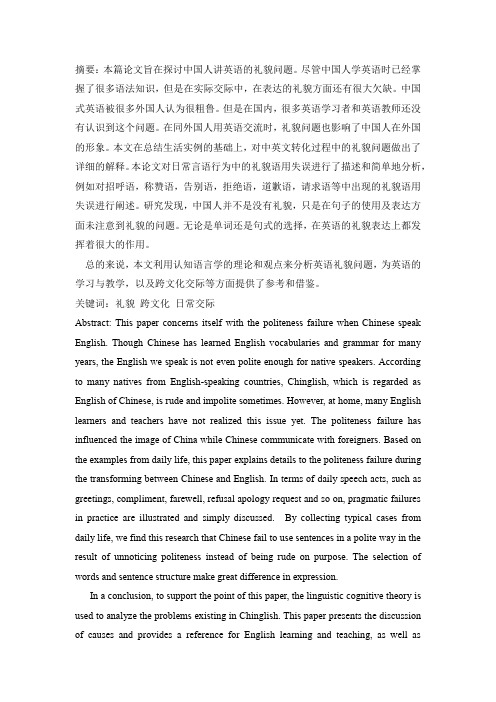
摘要:本篇论文旨在探讨中国人讲英语的礼貌问题。
尽管中国人学英语时已经掌握了很多语法知识,但是在实际交际中,在表达的礼貌方面还有很大欠缺。
中国式英语被很多外国人认为很粗鲁。
但是在国内,很多英语学习者和英语教师还没有认识到这个问题。
在同外国人用英语交流时,礼貌问题也影响了中国人在外国的形象。
本文在总结生活实例的基础上,对中英文转化过程中的礼貌问题做出了详细的解释。
本论文对日常言语行为中的礼貌语用失误进行了描述和简单地分析,例如对招呼语,称赞语,告别语,拒绝语,道歉语,请求语等中出现的礼貌语用失误进行阐述。
研究发现,中国人并不是没有礼貌,只是在句子的使用及表达方面未注意到礼貌的问题。
无论是单词还是句式的选择,在英语的礼貌表达上都发挥着很大的作用。
总的来说,本文利用认知语言学的理论和观点来分析英语礼貌问题,为英语的学习与教学,以及跨文化交际等方面提供了参考和借鉴。
关键词:礼貌跨文化日常交际Abstract: This paper concerns itself with the politeness failure when Chinese speak English. Though Chinese has learned English vocabularies and grammar for many years, the English we speak is not even polite enough for native speakers. According to many natives from English-speaking countries, Chinglish, which is regarded as English of Chinese, is rude and impolite sometimes. However, at home, many English learners and teachers have not realized this issue yet. The politeness failure has influenced the image of China while Chinese communicate with foreigners. Based on the examples from daily life, this paper explains details to the politeness failure during the transforming between Chinese and English. In terms of daily speech acts, such as greetings, compliment, farewell, refusal apology request and so on, pragmatic failures in practice are illustrated and simply discussed. By collecting typical cases from daily life, we find this research that Chinese fail to use sentences in a polite way in the result of unnoticing politeness instead of being rude on purpose. The selection of words and sentence structure make great difference in expression.In a conclusion, to support the point of this paper, the linguistic cognitive theory is used to analyze the problems existing in Chinglish. This paper presents the discussion of causes and provides a reference for English learning and teaching, as well asintercultural communication.Key words: politeness, cross-culture, daily communicationⅠ.IntroductionIn cross-cultural communication, pragmatic failure in politeness has become an essential problem. However, politeness is the key pragmatic principles in language use, especially in the intercultural communication between different groups. Due to some differences in language, culture, and some living environments, politeness in utterances differ dramatically from one community to another community sharing no universal language. In more and more exchanges,trade businesses and other interactive activities among different countries, different polite philosophy has brought various obstacles for inter-cultural communications. Because of those clear discrepancies from different groups,distinct understanding of communication context and other factors that a great number of pragmatic failures in politeness have become the prevailing phenomena in inter-cultural communication.Pragmatic failures in polite utterances are unavoidable. Participants as native speakers and those as non-native speakers encounter all kinds of violation of polite principles.Failures in politeness are most reflected in the speech acts to display the intended meanings and to convey the expected ideas. Therefore, the main issue to be discussed in this thesis is narrowed to the specific pragmatic failures in daily life. Ⅱ.Literature ReviewA.Politeness Study AbroadThe four conversational maxims proposed by Grice in logic and Conversation (1967) are formulated as quantity maxim, quality maxim, relation maxim and manner maxim. Grice advocates these conversational maxims and the Cooperative Principle (CP) to reveal the ways or the mechanisms by which people interpret implicature to accomplish their conversations. His theory has been seen as pragmatic principles in conversations for interpersonal communications.But there is another type of implicature that receives no account in the pragmatic theory of the cooperative principle, which is implicature of politeness. As argued by Thomas (1995), politeness as an illocutionary phenomenon, is closely connected withpragmatics.Following Thomas, we have grouped the pragmatic approach to politeness under four headings: the conversational maxim view advocated by Leech (1980), the face-management view proposed by Brown and Levinson (1987), the conversational-contract view put forward by Fraster (1990)and the pragmatic scales view presented by Spencer-Oatey(1992). Particularly, Leech …s six maxims which include the tact maxim, the generosity maxim, the approbation maxim, the modesty maxim, the agreement maxim and the sympathy maxim are regarded as the politeness principle.According to Leech, communicators generally observe some rules of good behavior which he terms the Politeness Principle. The principle can explain why people are sometimes indirect in conveying what they mean. It is a necessary complement that may rescue the CP from serious trouble in theorizing.B.Politeness Study in Chinathe most worth mentioning is Prof.Gu Yueguo (p237-257),who summarizes four essential elements of Chinese politeness:respectfulness, modesty, attitudinal warmth and refinement. Later on, Gu (1992) elaborates these four essentials into five maxims of politeness in Chinese, They are Self-denigration Maxim; Address Term Maxim; Refinement Maxim; Agreement Maxim; Virtues-word deeds Maxim.C.Studies of Pragmatic Failures AbroadThe notion of pragmatic failure has been initially defined by British linguist Thomas in her paper of cross—cultural pragmatic failure. Thomas defines it as “the inability to understand” what is meant by what is said (Thomas, 1983:p91-112). In other words, it means that the speaker‟s utterance is interpreted or understood by a hearer as different from what the speaker intends to be interpreted. So often pragmatic failure occurs in interactions between native and non-native speakers, and it also can be found in cross-cultural communications between native speakers.D.Studies of Inter-cultural Pragmatic Failure in ChinaChinese famous scholar Mr. He Ziran ( 2002) argues that the umbrella notion of pragmatic failure can refer to any failure that speakers have not accomplished theexpected effect in language communications. He remarks that it is not the wrong grammatical structure that leads to inadequate expression of meaning and sense.Chen Xinren (2004) has also explored pragmatic failures from the aspect of pragmatic competence.He holds that the skills of using language can be seen as pragmatic competence. Language grammar stipulates the correct form and structure of language, and semantic codes regulates that the form must take some meaning or sense.Ⅲ. The pragmatic failure of politeness in daily lifeA.Greeting failureWe are obviously more familiar with some expressions, such as, “hello”, “hi”“I am so sorry”. However, “Good bye” and “See you” is not always equal to the other. Especially when you are a waiter/waitress and the hearer is your customer. The customer can say “See you”when he/she is going to leave. This sentence means he/she likes to be here, and he/she may come here next time. But as a waiter/waitress, using “See you”seems too aggressive; actually, it will make customers feel uncomfortable. The best way, also the simplest way is just say “Bye”.Similarly, “You are welcome” cannot be used to answer every “Thank you”. It sounds too much formal. You can say “Cheers”or “No worry”. If the hearer likes saying “Thank you”, sometimes you can ignore his/her “thanks”and continue your speech. If you are the customer, there is no necessity to say “You are welcome” to the seller. The better way is just say “Thank you” back.According to last two examples, we can clearly see that some expressions in English are not as that familiar to us as what we think of. When we are at school or some other training institutions, we are taught their meanings, but those are the semantic meanings, as for pragmatic meaning, we can only get them from foreigner‟s laughter or contempt. Obviously, that is the reason that most foreigners think Chinese rude and impolite.B.Invitation failureWhen you get a good friend who is an America or British, someday, he says”Would you like to have dinner with me in my house?” Unfortunately, you do not havetime to go there. Some people may say “No, thanks. I have another appointment.”Then, congratulations, you probably will not be invited next time. Or even worse, you just lose a friend. How to say “No” politely is a complex skill no matter in China or abroad. In this condition, “Thanks”cannot make up the hurt you have made. In a polite way, you should say” That is a good idea. I would like to join in, but I have another appointment today.” In this way, you show that you are sorry about not going and give a respect to his/her invitation.C.Request failureIn a restaurant, you want to have a hamburger. You tell the waiter” I want a hamburger”. You are so lucky if he does not treat you like rubbish. It is not a polite way to give a request. Through this way, nothing can even be called “a request”. You should say “Could I have a hamburger, please?”, or “Can I have a hamburger, please?”.D.Euphemism failureWhen British say “I only have a few minor comments”, they mean “Please re-write completely”. But what others understand is “He has found a few typos”. This is a very common phenomenon in daily life. Sometimes, when a British says “Could we consider some other options?”, It means “I do not like your idea” But what others understand is “They have not yet decided.” These two examples show that we cannot get what the British mean completely. Then we should remember more examples.“That is not bad”means “That is good”. “That is very brave”means “That is very stupid” or “You are insane”. “Quite good” means” a bit disappointment”. “Very interesting” means “That is clearly nonsenses”.According to these examples, we can see that if we do not know anything about pragmatics, it is very difficult to get what they actually mean. In this condition, pragmatic failure in politeness is inevitable.Ⅳ. Reason analysis on pragmatic failure in politenessA.Model Verbs(Model Auxil-iaries)The cultured westerners would use model verbs more frequently to show their politeness to others. Therefore, model verbs like “can, could, may, might, and would”will function well in conversations. It sounds more polite to express suggestion, request, willing and so on. For example, “Pass me the salt” is less polite than “Could you please pass me the salt?” apparently.B.Subjunctive moodBy using words like”would rather, would sooner, would as soon”and “had”which is also called as subjunctive mood. It will cause hearer to feel that you are considering a better result or way to avoid the bad ones. It will also show that you are deducing the probable problems and trying to find a way to solve it.C.PleaseWhen “please” goes after the sentence, it sounds better than when it goes before the sentence. Because the sentence sounds like an order when you use “please” as the beginning of a sentence. For example, “Could you please reply to me by Monday? Thank you.” is much more polite than “Please reply to me by Monday. Thank you.”D.Passive voiceSometimes, declarative sentences may be stiff and impolite. This is time to use passive voice or negative sentences or interrogative sentences to show you politeness. In this way, it avoids our subjective opinions and gives the hearer a positive mood. For instance, “Every piece of luggage has to be examined through.” is better than “We will examine every piece of luggage”.E.Past tenseSimilarly, when you use past tense to make a request, it sounds more comfortable and acceptable. For example,”I thought you were needing me, Mr. Smith.”Ⅴ. ConclusionFollowing the definition of pragmatic failures in inter-cultural communication given by Thomas in the 1970s, pragmatic failures in inter-cultural communication has been the hot topic discussed by many scholars more than ever both at home and abroad and many scholars have explored the pragmatic failures from various points of view, such as sociolinguistics, psychology, second language acquisition and so on. This paper mainly investigates the pragmatic failures in politeness, more specificallyin a variety of polite speech acts.The studies of causes of pragmatic failures in inter-language communication can also be applied to those occurring in the politeness and such traditional causes are generalized into four categories as culture and language differences, language transfer in second language acquisition, teaching induced causes and violation of pragmatic rules in language use. But few scholars turn their attention to causes studies in a cognitive approach. That is a reason why this paper is engaged in the exploration of the causes leading to politeness failures in a cognitive perspective.The major causes of politeness failures discussed in this paper are concluded as politeness transfer, different culture-based cognitive environment and an improper choice of context. The study of the causes for politeness failures is on the basis of the common politeness failure phenomena in different speech acts. From a cognitive perspective, prototype and category theory as well as cognitive approach on relevance theory are applied to explain the causes for politeness failures in inter-cultural communication between Chinese and English native speakers.Though, this paper is facilitated with some new perspectives on the analysis of certain causes for politeness failures, there are still some other important causes to generate pragmatic failures, like individual factors, society and others. The focus here is only on three causes, which may be one limitation of this paper. Besides, due to some limitations, no empirical survey is conducted to illustrate the failure phenomenon, and some of those pragmatic failures are collected directly from the books of other scholars, but still they bear pragmatic significance and are scientific enough to be used as evidence in this paper.ReferencesBrown. P & Levinson. S. Politeness: Some Universals in Language Usage. Cambridge: Cambridge University Press, 1987.Leech, G.N. Principles of pragmatics. New York: Longman Group Limited, 1983. Levinson, S.C. Pragmatics. Cambridge: Cambridge University PressThomas, J. Cross-cultural pragmatic failure. Applied Linguistics. London: Oxford University Press, 1983.Yule, G. The Study of Language. Cambridge: Cambridge University Press, 1985陈新仁. 当代语用学. 北京: 外语教学与研究出版社, 2004.何自然. 语用学概论. 长沙: 湖南教育出版社, 2002何伟, 彭漪, 于晖. 当代语言学. 北京: 高等教育出版社,2007顾曰国. “Politeness phenomenon in modern Chinese.”Journal of Pragmatics 141- 990(1993): 237-257.何兆熊.Study of Politeness in Chinese and Eng1ish Cultures. 北京: 北京外国语大学出版社,1995。
语用学原则在大学英语听力教学中运用论文

语用学原则在大学英语听力教学中的运用【摘要】在大学英语听力理解中,学生不仅要推断出讲话者的显性交际意图,更重要的是推断出讲话者的隐性交际意图。
为了帮助学生更好地进行意图推理,本文以语用学的合作原则和关联原则为指导,初步探讨了其在非英语专业大学生听力理解中的运用。
语用学理论在大学英语听力理解中的实证运用,对促进大学英语教学健康发展将起到积极的推动作用。
【关键词】大学英语听力教学合作原则关联原则一、引言听力教学的目标是使学生能够根据语言的形式和意义推断出显性交际意图,进而根据显性交际意图,参照情景语境和文化语境推断出隐性交际意图。
听力理解的过程是一种负责的思维过程,语用学知识可以从理论上对听力理解进行分析。
在大学英语教学中,非英语专业学生并未系统地学习语用学理论,而更多是在进行语言操练。
为了促进学生更有意识地进行听力理解分析,本文将初步探讨合作原则和关联原则在非英语专业学生听力理解中的实际运用。
二、合作原则1.关于在交际中如何进行推理,受话人怎样推断发话人在特定的环境里所表明的意图内容,grice(1967)提出了理解话语意图内容的“合作原则”。
即根据目前交际的目的或方向,交际双方只有相互配合,朝向共同的目标努力,才可以促进交际的顺利进行。
在合作原则下,有四条准则体现了合作交际:①量的准则。
即话语应包含满足交际所需信息,不应包含超过交际所需的信息。
②质的准则。
即努力使说的话真实。
不要说你相信是虚假的话。
不要说你认为缺少足够证据的话。
③关系准则。
即要有关联。
④方式准则。
即说话要清楚明白。
避免晦涩,避免歧义,要简练,要有条理。
假定发话人是遵守合作原则的,因此他说的话有且仅有一个解释是符合合作原则的。
受话人依据合作原则、语境和句子的字面意义就能推断出发话人想要表达的交际意图。
通常情况下,非英语专业学生学习和了解“合作原则”知识后,按照准则标准进行推理,可以比较顺利、轻松地推理交际意图进行解释。
2.根据grice的理论,由推理而得出的解释叫做会话含意,包括一般含意和特殊含意。
语用学论文:语用学在大学英语教学中的应用
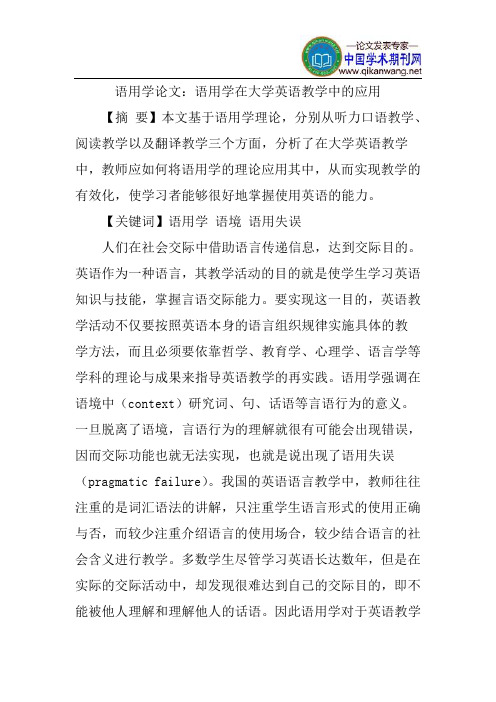
语用学论文:语用学在大学英语教学中的应用【摘要】本文基于语用学理论,分别从听力口语教学、阅读教学以及翻译教学三个方面,分析了在大学英语教学中,教师应如何将语用学的理论应用其中,从而实现教学的有效化,使学习者能够很好地掌握使用英语的能力。
【关键词】语用学语境语用失误人们在社会交际中借助语言传递信息,达到交际目的。
英语作为一种语言,其教学活动的目的就是使学生学习英语知识与技能,掌握言语交际能力。
要实现这一目的,英语教学活动不仅要按照英语本身的语言组织规律实施具体的教学方法,而且必须要依靠哲学、教育学、心理学、语言学等学科的理论与成果来指导英语教学的再实践。
语用学强调在语境中(context)研究词、句、话语等言语行为的意义。
一旦脱离了语境,言语行为的理解就很有可能会出现错误,因而交际功能也就无法实现,也就是说出现了语用失误(pragmatic failure)。
我国的英语语言教学中,教师往往注重的是词汇语法的讲解,只注重学生语言形式的使用正确与否,而较少注重介绍语言的使用场合,较少结合语言的社会含义进行教学。
多数学生尽管学习英语长达数年,但是在实际的交际活动中,却发现很难达到自己的交际目的,即不能被他人理解和理解他人的话语。
因此语用学对于英语教学的影响值得我们进一步探究。
一语用学的定义虽然目前语言学界对于语用学的定义和范畴还没有统一的见解,但语言学家都有一个共识,即语境是语言学的核心概念之一,是一门专门研究语境在交际过程中的作用的学科。
人们的正常语言交流总离不开特定的语境。
这里的语境包括交际的场合(时间、地点等)、交际的话题、交际的参与者以及上下文。
人们要判断一句话的意思,应当结合具体的语境,推断出它的真实含义。
离开了语境,也就失去了依据,在交流中有时难免会产生困惑甚至误解。
二听力口语教学方面将听力口语教学置于教学首位完全遵循了语言学习的规律。
教师在组织这方面学习的过程中,应刻意引入语用学的知识,结合交际语境,介绍日常交际话语的语用意义。
关于英语语言学论文范文参考
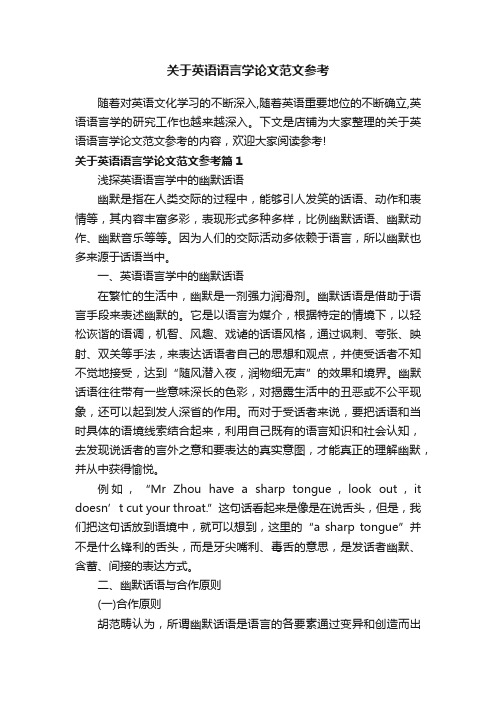
关于英语语言学论文范文参考随着对英语文化学习的不断深入,随着英语重要地位的不断确立,英语语言学的研究工作也越来越深入。
下文是店铺为大家整理的关于英语语言学论文范文参考的内容,欢迎大家阅读参考!关于英语语言学论文范文参考篇1浅探英语语言学中的幽默话语幽默是指在人类交际的过程中,能够引人发笑的话语、动作和表情等,其内容丰富多彩,表现形式多种多样,比例幽默话语、幽默动作、幽默音乐等等。
因为人们的交际活动多依赖于语言,所以幽默也多来源于话语当中。
一、英语语言学中的幽默话语在繁忙的生活中,幽默是一剂强力润滑剂。
幽默话语是借助于语言手段来表述幽默的。
它是以语言为媒介,根据特定的情境下,以轻松诙谐的语调,机智、风趣、戏谑的话语风格,通过讽刺、夸张、映射、双关等手法,来表达话语者自己的思想和观点,并使受话者不知不觉地接受,达到“随风潜入夜,润物细无声”的效果和境界。
幽默话语往往带有一些意味深长的色彩,对揭露生活中的丑恶或不公平现象,还可以起到发人深省的作用。
而对于受话者来说,要把话语和当时具体的语境线索结合起来,利用自己既有的语言知识和社会认知,去发现说话者的言外之意和要表达的真实意图,才能真正的理解幽默,并从中获得愉悦。
例如,“Mr Zhou have a sharp tongue,look out,it doesn’t cut your throat.”这句话看起来是像是在说舌头,但是,我们把这句话放到语境中,就可以想到,这里的“a sharp tongue”并不是什么锋利的舌头,而是牙尖嘴利、毒舌的意思,是发话者幽默、含蓄、间接的表达方式。
二、幽默话语与合作原则(一)合作原则胡范畴认为,所谓幽默话语是语言的各要素通过变异和创造而出来的。
而美国语言哲学家Grice则认为,幽默话语的作用是为了确保交际活动顺利进行。
Grice认为,在人们运用语言进行交际时,交际的双方(发话者和受话者)还要遵守一些先决条件和原则,例如使用双方都能熟练运用的语言、交谈内容是双方都熟悉的话题,还有最重要的合作原则(cooperative principle,CP)。
- 1、下载文档前请自行甄别文档内容的完整性,平台不提供额外的编辑、内容补充、找答案等附加服务。
- 2、"仅部分预览"的文档,不可在线预览部分如存在完整性等问题,可反馈申请退款(可完整预览的文档不适用该条件!)。
- 3、如文档侵犯您的权益,请联系客服反馈,我们会尽快为您处理(人工客服工作时间:9:00-18:30)。
The Cooperative Principle of Pragmatics:An Analysis of the Verbal Humour in the Sitcom Home with KidsSince the language was born, the research of it has never interrupted. Humor is the spice of our lives, leave it the life will be boring. Pragmatics is a main branch of Linguistics, with the development of pragmatic theory, linguists and hobbyists from many angles analysis on verbal humor and achieved fruitful results.While cooperative principle, as one of the most important pragmatic principle, makes a systemic study about language use and lays a solid foundation for later development of pragmatics. The violation of cooperative principle can often generate conversational implicature or achieve certain communicative effects. On the basis of previous humour and pragmatic theory research, I will analysis from the point of the cooperative principle of those verbal humour dialogue in the sitcom "Home with Kids", which reflects the daily life of a rebuilt family and attracts many Chinese audiences by its creating writing, good acting as well as its wonderful transcripts.1. Four Maxims of the Cooperative PrincipleIn 1975, the language philosopher H. P. Grice published a seminal article entitled “The Cooperative Principle” which created quite a stir in the linguistic world and generated a large number of linguistic publications that are built on Grice's postulates.According to Grice, in conversational exchange, people usually try to reach a common goal by mutual efforts or at least make the conversation develop in the direction of their expectation. To achieve this, people need to cooperate with each other. Grice' theory of the cooperative principle explains how it is possible for the speaker to convey more than what is literally said and foe the hearer to understand.The four maxims of CP are Quantity Maxim, Quality Maxim, Manner Maxim and Relation Maxim. The maxim of quantity has two sub-maxims that require the cooperative speaker to say as much as but no more than is required for his particular purposes in the talk exchange. The maxim of quality also has two sub-maxims, which demands that the speaker say only what he believes to be true and for which he hassufficient evidence. The maxim of relation urges the speaker to make his contribution relevant to the communication context. The maxim of manner requires the speaker to be methodical and to avoid ambiguity, prolixity, and obscurity. In short, as Grice put it for the cooperative principle, "make your conversational contribution such as is required,at the stage at which it occurs, by the accepted purpose or direction of the talk exchange in which you are engaged". The cooperative principle is the foundation of pragmatic interpretation of humor, of which the flouting of maxims plays a very important role.2. Floutings of CP Maxims and Humor ProductionIn actual conversation, a participant may deliberately flout CP maxims for some reason or special need. As an important category of non-observance of the conversational maxims, a flout is distinguished by deliberately triggering the hearer's search for an implicature. The speaker employs this way seemingly against the cooperative principle to reinforce the communicative effect. In this way the speaker can make his conversation humorous and thus produce the effect of humor. In fact, flouting of the CP is often seen in Chinese sitcoms. Of course, sitcom writers also deliberately flout the principle in order to achieve humorous effects.2.1 Flouting the Quantity MaximWhen a speaker offers more or less information than is required by the situation with the intention of generating an implicature, he flouts the maxim of quantity. Look at the following example:(1) (In Episode 093, Liu Xing goes to Internet café and Liu Mei keeps asking what he did there.)Xing: You'd better not interfere with my business from now on!(以后我的事情你少管.)Mei: What did you say? I don't interfere with your business? Why didn't you say it when I breast-fed you? Why didn't you say it when you were sick? Why didn't you say it when you fell to the ground?Why didn't you say it when you couldn'twalk? You don't want me to interfere with you now, because you are grown up and can do whatever you want?(你说什么呢?再说一遍!我少管?你小时候喝奶的时候怎么不说?小时候生病的时候怎么不说呀? 摔跟头时候怎么不说呀?学会走路时候怎么不说?这时候让我少管。
你翅膀硬了,自个会飞了?)In this episode, the mother is very angry about what Liu Xing did and said; she is so angry that she can’t help talking excessively about the matter, which sounds humorous. This obviously violates the second sub-maxim of quantity: Do not make your contribution more informative than is required.(2) Let's take another episode as an example:Dad didn't get home on time, Liu Mei ask Xiao Yu to call his cell phone, after made the phone callMei: Who answered the phone? (谁接的电话?)Yu: A woman. (一个女的。
